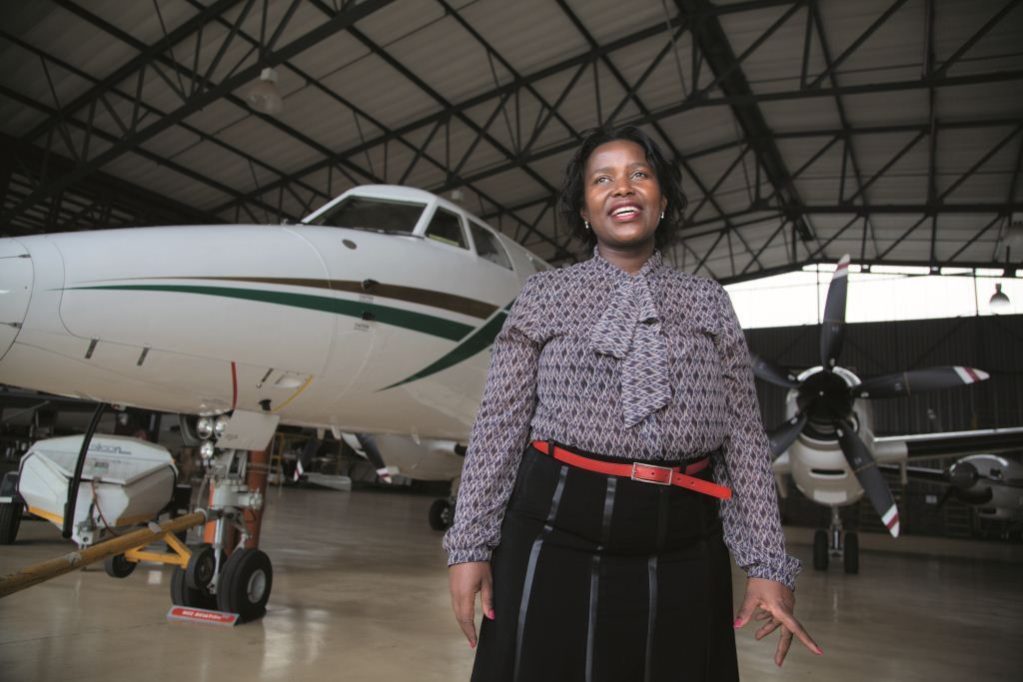Sibongile Sambo spent most of her childhood looking up at the big tubes of metal in the sky. Each time she heard a helicopter or a plane, she would stop everything and imagine how it would feel to be 40,000 feet above sea level.
In her early twenties, Sambo applied to be an airhostess and it had seemed she had the job in the bag. She passed all the written and physical tests and impressed the panel with her knowledge of aviation, but there was one small problem.
“I was too short (1.5m) and at that time they were still really strict about the 1.6m height. I understand why. It’s because they needed people who could easily reach the cabin and be able to take out and pack in the clients’ bags.”
Sambo was later offered a position as crew on a smaller domestic flight, but she had just completed her degree and, after much deliberation, passed up on her dream for a desk job. Years later, while working at De Beers, she found just the opportunity to dream again.
“The position I was in allowed me to fly in their private jets, to all other operations to either Botswana or Namibia. That rekindled the actual love for private jets. And I liked the idea of private jets because you don’t have to wait in queues at the airports.”
Loading...
Sambo quit her job to focus on her new love of private jets. She registered her company under Sibongile Rejoice Sambo Aviation (SRS Aviation) and naïvely applied for a tender the government was offering aviation firms for cargo transportation.
“I took it very lightly. You know when you submit a bid, it’s your first time and you actually don’t believe you will get it. And in this industry, I thought it would take me much longer than it did,” she says.
Sambo won the bid and had to raise R1 million ($92, 890) to get the plane from Dubai to South Africa to move the cargo. She applied for loans, but was turned away from businesses that said aviation was risky and her lack of experience was a disadvantage. There was one person Sambo could always count on, her mother.
“She was working as a nurse in London. She came back, released her pension money and asked her sister to also assist with her pension money,” says Sambo.
The job went better than expected and Sambo managed to repay everyone. SRS Aviation began to generate a steady clientele and the money rolled in. She became the first South African woman to own an aviation company, which is 100% black female-owned. Despite her accomplishments, she was often criticized for her lack of experience and many thought she would not survive in the male-dominated industry.
In 2010, disaster stuck. Clients began to pull their planes from SRS Aviation, in what Sambo believes was a plan devised to sabotage her. So, when the Civil Aviation Authority (CAA) came to inspect her operation, there were no planes in her hangars and no recorded flights, as she was no longer managing the planes that had once operated under her license. Sambo lost her license.
“It has been such a roller-coaster. The business took off very well from 2004 to 2007. In 2008, we started seeing a little bit of a slowdown. In 2009, we saw the jet fuel hike, and in 2010 the recession came. So, we experienced a huge dip and I basically retrenched everyone.”
In 2013, Sambo reacquired her license and business began to boom. She currently has seven employees and generates an annual turnover of R5 million ($462,850), which she says is little in comparison to their R35-R50 million turnover during the good days.
Over the years, Sambo has received recognition for her achievements in the industry. In 2007, Fortune Magazine named her a ‘Leader of Tomorrow’, and in 2009 she was nominated for the Queen Victoria Memorial Award by the Europe Business Assembly in London. Last year, she was placed on the FORBES ‘10 Young Africans Millionaires to Watch’ list.
“I wish I could tell people that it doesn’t look as easy as you read about. It made me feel happy that I didn’t lose hope and just let my dream die. I persevered and I hung on to some of my investments, which helped me get back on track.”
SRS Aviation offers services that include: VIP charter, air cargo charter, tourist transfers and film work. It has expanded into supplying aircraft spare parts for Boeing and Airbus and is looking at handling ground equipment for airports.
“I still don’t own any airplanes. I still lease people’s airplanes, so they come and go on my license. That is a challenge because I can’t really be completely in control of the particular machine. Therefore, I can’t really control my time.”
Being in an industry that is not female-dominated has made Sambo a role model. She has proven that when it comes to dreaming, the sky is certainly not the limit.
Loading...
